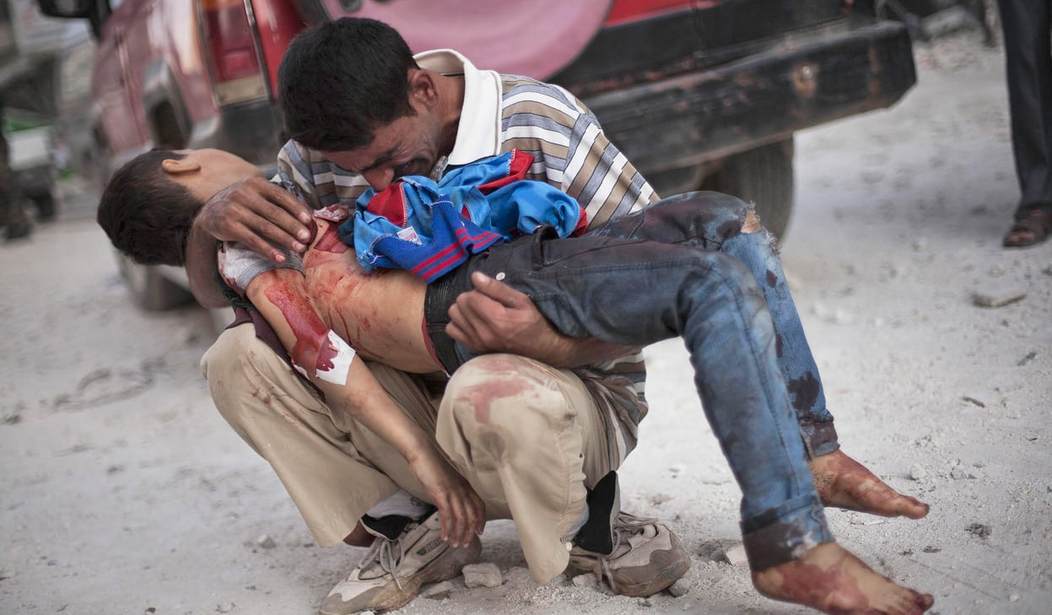A former Syrian general told PJM from an opposition base just outside the country today that forces fighting the regime of Bashar al-Assad critically need Western assistance before the dictator unleashes a catastrophic, last-stand attack on scores of civilians.
And if Washington or the European Union are concerned that weapons given to the Syrian resistance would fall into the wrong hands, the opposition leader has a solution: put them on loaner.
“If they decide to help us militarily by air or any way to help getting rid of this present regime, it’s very welcome,” the defected general, who wished to remain anonymous, said. “If it’s not going to happen this way, let them give us the weapons to get rid of the last bastion of the regime.”
That includes systems able to target the skies and even the playing field with one of Assad’s remaining strengths: an air force.
“I wish you guys can do something — give us everything that will empower us to get rid of this regime,” he continued. “Don’t be afraid that we’re going to keep those weapons and one day invade the neighbors. We’ll give you the last weapon after we take over the power.”
“We’re interested in rebuilding our country and getting rid of the evil in this country. …If the Americans or other parties are ready to help the Syrians help overturn the existing regime, I would beg you that they need to do it through the Syrian military.”
Numerous high-level defectors such as himself, the general said, “are ready to fight the final fight” to defeat “something above description — the crimes that are happening.”
“They’re like animals, like a beast on a rampage; there is no conscience there,” the general said of Assad’s loyalists. “…I am surprised that nothing has been done in the international community to save the people.”
The crimes against civilians include the torture and execution of children, sexual torture, and the torture and murder of hospital patients. Some of these grisly attacks have been documented by cell phone video and shared with the world via Syrian social networkers.
But the 40,000 death toll could climb sharply if Assad dips into his weapons of last resort as he struggles to hold on to the last gasp of his 12-year rule.
“I would say he’s definitely gone and the regime is falling day after day,” the general said, adding Assad can’t go “one meter” outside his palace. “He’s 75 percent gone.”
“The location of where he is is allowing him to resist a little bit. … He will do everything to the last man. He will use everything, including the chemical weapons. Don’t doubt about that — he will use everything.”
“I hope as God is my witness that the solution will come as a political solution,” the general continued. “I tell you why there will be a tragedy. I cannot imagine what will be used. He’s not going to leave alive.”
He added, “There’s no doubt in mind at any time he can use destructive weapons against the population.”
Washington said last week it fears Assad using his chemical weapons as rebels close in on Damascus and the president feels boxed in.
“We have sent an unmistakable message that this would cross a red line and those responsible would be held to account,” said Secretary of State Hillary Clinton.
The general called the chemical weapons a “very, very, very important problem — we’re seeing them going toward Lebanon, which is an extremely dangerous situation that we should be very aware of. Very extremely dangerous.” Here, of course, they would fall into the hands of Assad ally Hezbollah.
Those fighting Assad hope that the solution, be it diplomatic or military, comes before a “catastrophic” slaughter by the flailing dictator, who still has the powerful intelligence sector on his side.
“If the opposition was granted a good discipline, were really backed by a good strategy and armaments, there wouldn’t be anything left by the government,” the general told PJM. “If we did have a good strategy from the beginning, I tell you there wouldn’t be any military fighting at this point.”
The Syrian revolution began in March 2011 with peaceful street protests against the reign of Assad, inspired by other Arab Spring movements calling for democratic government in the region. As Assad slaughtered civilians in response, disillusioned generals left their posts and rank-and-file soldiers crossed to the opposition, too. Longtime opposition groups — representing the country’s diversity from Christians to Islamists, Kurds to Assyrians — forged a political leadership in exile, leading from the Syrian National Council to the newly formed National Coalition for Syrian Revolutionary and Opposition Forces.
And while the State Department is designating one group of Syrian rebels as a terrorist group — the al-Nusra Front (deemed an extension of al-Qaeda in Iraq) — in an effort to isolate extremists who would take advantage of the political instability, the general takes umbrage at characterizations of this revolution as one of hardline militant Islamists.
“I would like to give you my word of honor and to all the American public that there is no presence of al-Qaeda in Syria,” he said. “Whether Muslim or Christian or Alawi, everything that you look at, it’s coming from the people — it’s the people, your regular people from the street, fighting.”
He stressed that in Syria, a conservative Muslim isn’t like one you’d find in Afghanistan or Pakistan — a Salafist, he said, is basically considered as one who prays more than your average Muslim.
He does point to the Iraq War and Assad sending jihadists over the border to conduct suicide bombings and other attacks. “If you want to search for any traces of al-Qaeda, look no further than the government of Syria,” the general said.
“They were fueling extremists of all types whether from the right or left,” he said. “Everything was controlled and used to back the power of the intelligence of Syria.” Assad consistently tries to brand the opposition as “terrorists.”
And those who have protected and armed the Assad regime won’t have a new friend in a democratic Syria.
“Yes to the United States, yes to Europe, and no to Russia — we don’t want to deal with anything or anyone coming from this part of the world,” the general asserted.
The general vows that a peaceful Syria, representing its myriad ethnic and religious groups, can even be a force for stability in other regional crises.
“We want peace,” he said. “Please don’t stick any kind of labels to us.”









Join the conversation as a VIP Member